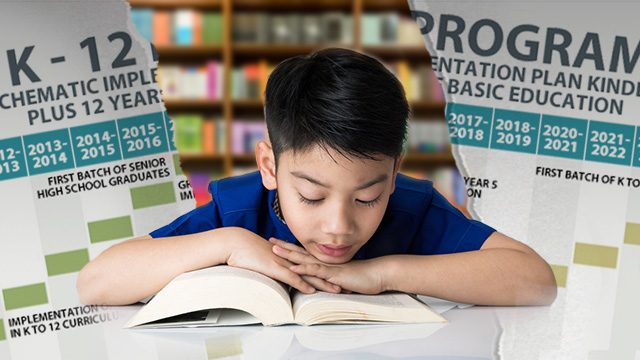SUMMARY
This is AI generated summarization, which may have errors. For context, always refer to the full article.
 Please put down your pitchforks. Like it or not K to 12 is happening.
Please put down your pitchforks. Like it or not K to 12 is happening.
If you’re not in favor, you’re most likely a parent who is concerned you will have to shell out more money before your child could graduate. Or perhaps you’re a teacher who has issues on how the curriculum has been gerrymandered to favor some subjects over others.
Unfortunately resistance seems futile at this point. It appears all but certain that the program will push through.
Take heart though, because K to 12 doesn’t matter. (INFOGRAPHIC: What’s K to 12?)
I don’t mean to denigrate all the hard work that a lot of smart people have put into designing and implementing the program. If you’re in favor of K to 12, please also put down your pitchforks. (READ: Petition against K to 12)
Same old, same old
K to 12 doesn’t matter because it’s simply more of the same from our flawed concept of education. Stay in school, earn degrees, stick some letters before or after your name. The assumption is that more years in school increases the likelihood that the student will actually pick up something useful.
This is false in a lot of cases, as demonstrated by some of the questionable statements from professionals with advanced degrees. I’ve heard doctors advise that condoms are not an effective means of preventing HIV since the virus is so small it can pass through a latex membrane. This is completely false; condoms do protect us against HIV.
I’ve heard judges lecture that if an accused refuses to testify that’s a sign of guilt. This is completely false, as stated in our Constitution.
Education unfortunately does not cure ignorance. It should but it doesn’t because most schools are worried about quantifiable measurements of “knowledge.”
Memorize the primary resources of each region of the country, quiz on Monday; learn what a transitive verb is and how this falls into the S-TV-DO sentence structure, quiz on Tuesday; practice your polynomial equations, quiz on Wednesday.
Schools, as they are set up now, rarely inculcate curiosity or a healthy dose of common sense.
One time I had to interview a fresh graduate for a job opening. He had just graduated from a school in the province with a degree in physics and his former dean wrote him a glowing letter of recommendation. He was about half an hour late so I called him to see if he was going to make the interview. When I reached him he said he wanted to attend the interview, but he didn’t know how to commute from where he was staying to the interview site.
Here’s a smart student, told well in advance he had to be in a certain place, and instead of figuring things out he opted to stay at home and pass up a job opportunity. It is doubtful that additional years of schooling would have improved his mindset.
What’s really important

Certainly education is important. Putting your children through school is important. Agonizing over the curriculum is important.
But what is more important than pushing children through more years of enforced drudgery is ensuring that children are intellectually curious so that they strive on their own to discover what else is out there. For there will always be something more, something not covered in lessons or plans. A precocious child isn’t developed by a school, no matter how many years there are in the curriculum.
If not school, what then?
At this point I will admit my ruse. My summoning of K to 12 was a Trojan horse to get you interested in an old fashioned suggestion: We should encourage people to read. Everyone, not just children, not just old ladies with nothing better to do, not just the snooty folk who think reading is about literature with a capitol L.
Read anything, in any language, from comics in Ilocano to old myths in Waray to science fiction in English. Read in whatever language or form you are comfortable with. There is no “wrong reading,” whether it be the latest Paolo Coelho book or a trashy Tagalog romance novel. Read Wikipedia and conspiracy theories online. Read Sweet Valley Twins or Transmetropolitan. Read the paper, a tabloid, the travel magazine on the airplane.
Just read.
Read while waiting in line at the bank, while having a meal by yourself, while on your commute home or even in your spare time.
Certainly reading is not the magic cure all either for ignorance. Readers are not smarter than nonreaders. I know bar topnotchers who don’t enjoy reading.
Readers are not better writers than nonreaders. This is sad but true. I know people who enjoy reading but whose concept of writing is iterative blog entries revolving around the theme of woe is me. Okay, I had to draw the line somewhere. There is no such thing as “wrong reading” but there is such a thing as bad writing.
Readers are not more openminded than nonreaders. I know readers who are horribly racist.
What sets readers apart though is that they are intellectually curious. They want to know how the story ends, how the monster is defeated, how smashing particles together reveals physics from right after the big bang. Readers tuck away into their own little worlds and emerge better equipped to engage with the real world. The mere act of reading signifies curiosity as you’re always reading to find something out.
Reading is its own education.
In an ideal world, education wouldn’t be about the years you spent stuck in a chair and the grades you received. Rather it would be about one’s curiosity and creativity, one’s willingness to consider new ideas and change one’s thought based on new knowledge.
Education shouldn’t end with closure – “I got an A” or “I know this skill” – but with the acknowledgment that there is so much still left to discover.
How long a child stays in a classroom matters less than what he takes with him into the classroom. Please put down your pitchforks. Pick up a book, and read it to yourself, to someone, to anyone. – Rappler.com
Antonio Conejos is grateful to his parents who let him take up literature in college instead of other, more useful, courses. He previously taught Freshman English for 3 years at the Ateneo. He is at times a lawyer, sometimes a dabbler in business; but always a reader.
Add a comment
How does this make you feel?
There are no comments yet. Add your comment to start the conversation.